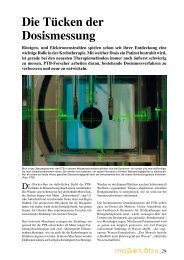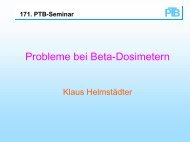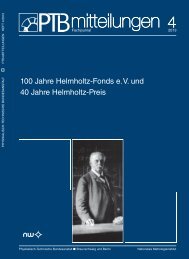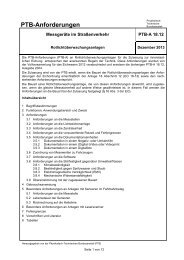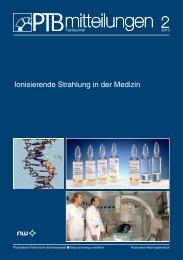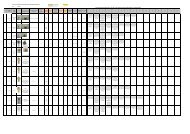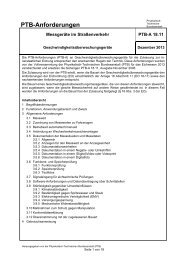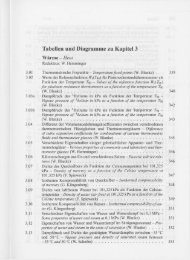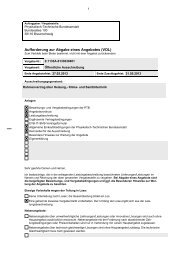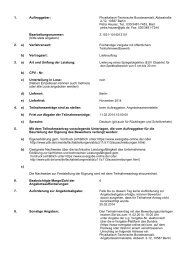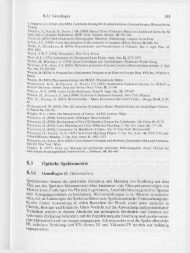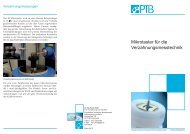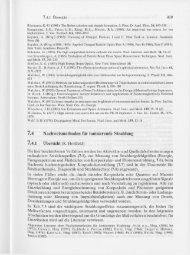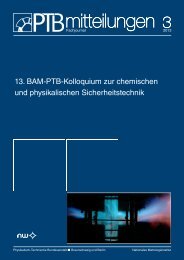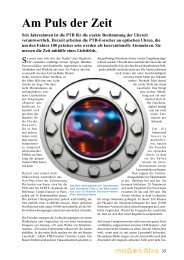PTB-Jahresbericht 2005
PTB-Jahresbericht 2005
PTB-Jahresbericht 2005
Erfolgreiche ePaper selbst erstellen
Machen Sie aus Ihren PDF Publikationen ein blätterbares Flipbook mit unserer einzigartigen Google optimierten e-Paper Software.
Nachrichten des Jahres • News of the year<br />
Neues Primärnormal für die Wasser-<br />
Energiedosis<br />
Die <strong>PTB</strong> betreibt eine neue Primärnormal-<br />
Messeinrichtung für die Darstellung der<br />
Einheit Gray (Gy) der Wasser-Energiedosis,<br />
DW, für 60 Co-Gammastrahlung. Ein Wasserkalorimeter<br />
löst das bisherige, seit rund 25<br />
Jahren eingesetzte Normal ab, welches auf der<br />
Totalabsorption der ionisierenden Strahlung<br />
in Eisensulfatlösung basierte. Durch den<br />
Übergang wurde die relative Standard-Messunsicherheit<br />
von früher 0,5 % auf 0,2 % reduziert.<br />
Da die zu messende strahlungsinduzierte<br />
Temperaturerhöhung am Messort innerhalb<br />
eines Wasserphantoms mit ca. 0,24 mK pro Gy<br />
sehr gering ist und das Kalorimeter bei einer<br />
Wassertemperatur von 4 ∞C betrieben wird,<br />
ergeben sich hohe Anforderungen sowohl an<br />
die Messtechnik als auch an die Temperaturstabilisierung<br />
des Kalorimeters. Um geringe<br />
Standardmessunsicherheiten zu erzielen,<br />
wurden die Auswirkungen verschiedener<br />
Einflussgrößen, wie z. B. für Wärmeleitungseffekte<br />
oder des so genannten kalorischen<br />
Defektes, sorgfältig analysiert und korrigiert.<br />
Dies geschah mit Hilfe detaillierter experimenteller<br />
Untersuchungen für unterschiedliche<br />
Bestrahlungsbedingungen sowie auf Basis<br />
vergleichender Modellrechnungen zum<br />
Wärmetransport bzw. zur Radiolyse von<br />
Wasser.<br />
Mit dem Beginn des Jahres 2006 wird die<br />
Kalibrierung von Sekundärnormalen für die<br />
Wasser-Energiedosis auf Basis des neuen<br />
Primärnormals durchgeführt. Dies führt zu<br />
einer Änderung der Kalibrierfaktoren<br />
um ca. 0,2 %.<br />
Das Wasserkalorimeter (Sicht auf<br />
das Strahlungseintrittsfenster) vor<br />
der 60 Co-Bestrahlungsanlage der<br />
<strong>PTB</strong><br />
The water calorimeter (view onto<br />
the radiation entrance window) in<br />
front of the 60 Co irradiation facility<br />
of <strong>PTB</strong><br />
22<br />
New primary standard for the water<br />
absorbed dose<br />
<strong>PTB</strong> operates a new primary standard measuring<br />
device for the realization of the unit<br />
Gray (Gy) of the water absorbed dose, DW,<br />
for 60 Co gamma radiation. A water calorimeter<br />
replaces the standard used for almost 25 years<br />
which was based on the total absorption of<br />
ionizing radiation in ferric sulphate solution.<br />
By the transition, the relative standard uncertainty<br />
was reduced from formerly 0.5 % to<br />
0.2 %.<br />
As the radiation-induced temperature increase<br />
at the place of measurement is very<br />
small inside a water phantom (approx.<br />
0.24 mK per Gy), and as the calorimeter is<br />
operated at a water temperature of 4 ∞C, very<br />
high requirements must be met by both the<br />
measuring technique and the temperature<br />
stabilization of the calorimeter. To achieve<br />
small standard uncertainties, the effects of<br />
different influence quantities such as, for<br />
example, thermal conduction effects or the socalled<br />
caloric defect, were carefully analyzed<br />
and corrected. This was done with the aid of<br />
detailed experimental investigations for<br />
different irradiation conditions as well as on<br />
the basis of comparative model calculations<br />
for heat transport and/or radiolysis of water.<br />
Beginning with the year 2006, calibration of<br />
secondary standards for the water absorbed<br />
dose will be performed on the basis of the<br />
new primary standard. This will change the<br />
calibration factors by approx. 0.2 %.



